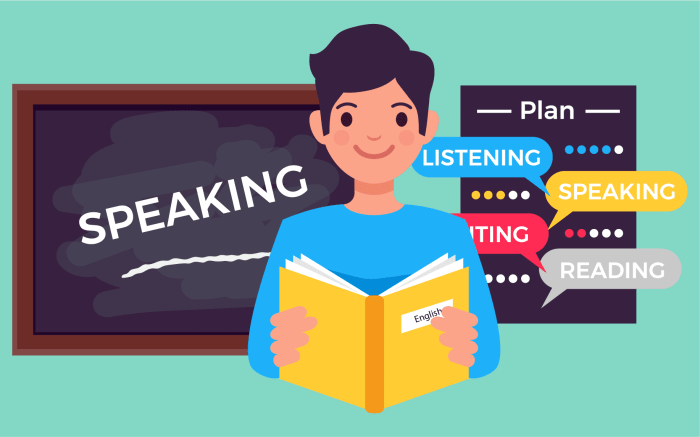How to develop my spoken english – Embark on a journey to enhance your spoken English, transforming it into a powerful tool for communication and personal growth. This guide unveils practical strategies and techniques to elevate your fluency, pronunciation, and conversational abilities, empowering you to express yourself with confidence and clarity in any situation.
Immerse yourself in the vibrant world of English through engaging activities, focused vocabulary expansion, and meticulous attention to pronunciation and intonation. Master the nuances of grammar and syntax, gaining a deep understanding of the language’s structure. Engage in dynamic conversations, honing your ability to initiate, maintain, and contribute effectively to discussions.
Immersive Language Learning: How To Develop My Spoken English
Immersive language learning is a method of acquiring a new language by surrounding oneself with the target language in all its forms. This means exposing yourself to the language through media, conversations, and social interactions, with the goal of becoming so familiar with it that you start thinking in the new language.
There are many benefits to immersive language learning. For one, it can help you learn the language more quickly and effectively than traditional methods of language learning, such as taking classes or using textbooks. This is because you are constantly exposed to the language, which allows your brain to absorb it more easily. Additionally, immersive language learning can help you develop a more natural accent and pronunciation, as you are learning the language from native speakers.
There are many different ways to immerse yourself in a new language. One way is to watch movies and TV shows in the target language. This is a great way to learn new vocabulary and phrases, as well as to get a sense of the culture of the country where the language is spoken. Another way to immerse yourself is to read books and articles in the target language. This can help you improve your reading comprehension and expand your vocabulary.
You can also immerse yourself in a new language by talking to native speakers. This is a great way to practice your speaking skills and get feedback on your pronunciation. If you don’t know any native speakers, you can find language exchange partners online or through local language learning groups.
Language Exchange Programs
Language exchange programs are a great way to immerse yourself in a new language and meet new people. These programs pair you up with a native speaker of the language you are learning, and you take turns practicing speaking each other’s languages. This is a great way to get real-world practice speaking the language and to learn about the culture of the country where the language is spoken.
Online Language Learning Platforms
There are many online language learning platforms available that can help you immerse yourself in a new language. These platforms offer a variety of resources, such as interactive exercises, videos, and audio recordings. They can also connect you with native speakers of the language you are learning, so you can practice speaking and get feedback on your pronunciation.
Active Listening and Comprehension
Active listening is a key skill for immersive language learning. When you listen to native speakers, pay attention to the words they use, the way they pronounce them, and the grammar they use. Try to understand the meaning of what they are saying, and don’t be afraid to ask questions if you don’t understand something.
Comprehension is also important for immersive language learning. When you read or listen to something in the target language, try to understand the meaning of what you are reading or hearing. Don’t just focus on the words; try to understand the ideas and concepts that are being communicated.
Focused Vocabulary Expansion
Enhancing your vocabulary is crucial for boosting your spoken English. Identifying and prioritizing words relevant to your specific goals will help you focus your efforts and make the most of your time.
To identify relevant vocabulary, consider the situations you encounter in your daily life or professional settings. Note down the words you hear or read that you don’t understand. Additionally, explore resources like dictionaries, thesauruses, and online vocabulary lists tailored to specific topics.





